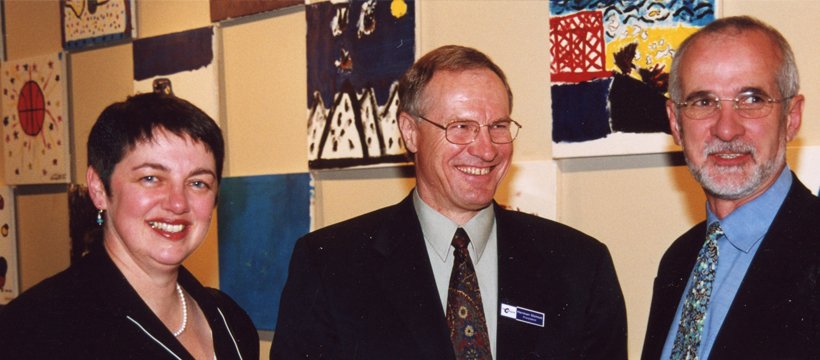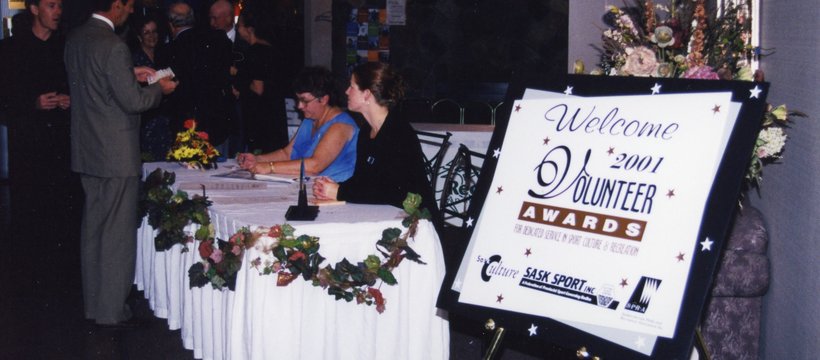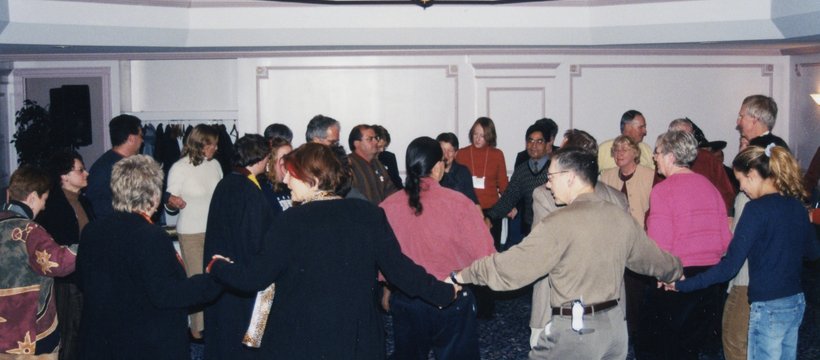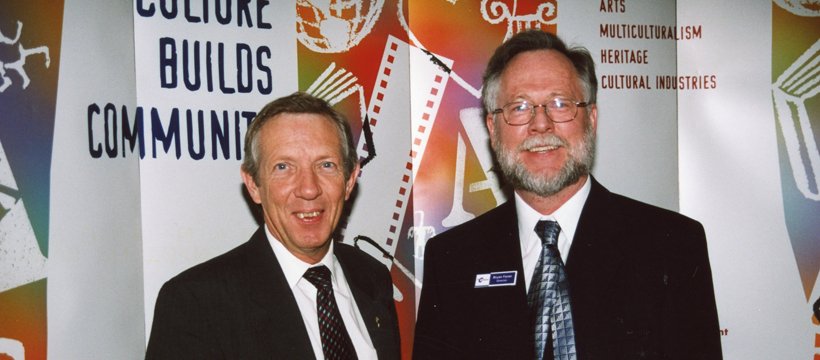Bumps in the Road to Celebration: 2001 - 2004
The year began with the establishment of a new government department known as Saskatchewan Culture, Youth and Recreation, led by Minister Joanne Crofford. Along with a new government department came a new vision of celebration and community engagement in the province. By 2002, the partners in sport, culture and recreation, were working on delivering several Centennial initiatives funded by the provincial government’s Community Initiatives Fund: Saskatchewan...in motion, Celebrating Community Centennial Grant program, Facilities Grant Program and the Aboriginal Participation Initiative. SaskCulture successfully advocated for the development of an Arts and Culture Leadership component to the Aboriginal Participation Initiative, which was designed and delivered by the Saskatchewan Arts Board. SaskCulture had also made changes to its own funding program – the Cultural Assistance Program – to address the needs of the Centennial.
Tourism and events promotion continued to top the list for SaskCulture and its partners, particularly as the province’s centennial was included in many organizations and community plans. SaskCulture joined its partners – Sask Sport and Saskatchewan Parks and Recreation Association, Tourism Saskatchewan the provincial Anniversaries Secretariat – in funding Events..Saskatchewan!, an initiative designed to increase the promotion of the benefits of sport, culture and recreation events, by focusing on links to tourism. As one of its first projects, Events…Saskatchewan! completed profiles of Events & Festivals in the province, as well as tourism profiles for each of the Provincial Cultural Organizations (PCOs are now known as Eligible Cultural Organizations (ECOs).
All activities and celebrations planned for Saskatchewan relied on the generosity and commitment of volunteers. As Canada celebrated 2001 as the International Year of the Volunteer, SaskCulture and its partners worked together on a provincial volunteer strategy, which would eventually form the basis for the Premier’s Voluntary Sector Initiative. In the meantime, SaskCulture continued to work with its partners on the Volunteer Awards for Sport, Culture and Recreation, as well as hosting a volunteer themed conference, Building Our Strength: Our Impact and Our Volunteers in Moose Jaw at the Moose Jaw Art Gallery and Museum. In 2003, SaskCulture was selected by the National Developing Human Resources in the Voluntary Sector Project to host one of four Human Resource Peer Learning pilot projects in Canada. As a result of these efforts, SaskCulture contracted a human resource consultant in September 2003, on a retainer basis, to provide human resources services for member organizations.
Another important project during this time was the work by the Tri-Global partners on the Aboriginal Funding Review, which was designed to address First Nations and Métis participation in sport, culture and recreation. Besides a review of funding programs and organizational policies, SaskCulture and its partners participated in Aboriginal Awareness training sessions for staff and membership. At this time, the Métis Cultural Development Fund (MCDF) was established by SaskCulture, in a partnership with Gabriel Dumont Institute, as a two-year pilot project to support community-based cultural activities and initiatives that preserve and pass on Métis culture and traditions. By 2002, the partners were all working on a Tri-global Aboriginal Action Plan, which continued its implementation for several years. For SaskCulture, this work included creating a new Aboriginal Coordinator position and the development of an Aboriginal Community of Interest mechanism. By the end of the year, the Aboriginal Coordinator had conducted a series of consultations around the province, including in the North, and with First Nations and Métis individuals and groups.
Early in 2004, the newly-formed Multicultural Community of Interest Committee, with the Multicultural Council of Saskatchewan (MCoS) in a secretariat role, established a working definition of multiculturalism. A definition for Cultural Industries was also developed at this time by the Saskatchewan Cultural Industries Development Council. Both definitions were incorporated into SaskCulture’s Cultural Policy in 2004.
In other multicultural work, SaskCulture provided support to the Working, Living and Playing Together Project in 2002, which endeavored to help sport and recreation groups recognize the importance of multiculturalism and the need to combat/eliminate racism. SaskCulture also worked with its partners and the Canadian Red Cross, that same year, to establish RespectEd for Sport, Culture and Recreation. This program was designed to assist community groups with resources to prevent and handle situations where children and youth may be exposed to abuse and harassment. In 2003, the program was the recipient of the Humanitarian Services Award from the Canadian Red Cross Society.
Several government programs emerged during this period that impacted SaskCulture and required feedback. The Role of the Schools report emerged on the scene in 2002 and SaskCulture responded with several recommendations made based on the new Schools Plus model, which although it had potential, would not survive the change in government. And, as rural issues were emerging, SaskCulture’s General Manager also presented on behalf of culture at a conference for the Saskatchewan Action Committee on Rural Revitalization (ACRE).
It was also in 2002, that SaskCulture began to administer the Centennial Student Employment Fund on behalf of Saskatchewan Culture, Youth and Recreation. This program was a great opportunity for cultural groups to hire students during the summer months, and the cultural community was an avid supporter of the program. While it changed names over the years, it continued to remain a popular program. In 2013, the fund was pulled back into one main Student Employment Program delivered on contract by Sask Sport.
Back in 2002, with more employment opportunities available in the culture sector, SaskCulture took the initiative to establish a Job Gallery on its web site to promote cultural employment vacancies – another successful initiative that continues to remain popular with the community.
The SaskCulture Board was also busy working to ensure that the organization was responsive to the changing environment of this period. Early in 2000, the SaskCulture board formed the Spending Plan Committee, and by 2002, it also began addressing gaps in the cultural policy it adopted from SCCO. By 2004, the Board was reviewing its partnership with the Saskatchewan Arts Board. Before the end of 2004, both boards had signed a Letter of Agreement, which outlined a new working relationship for the two organizations.
In the middle of this time frame, another lottery licence was drafted for renewal. SaskCulture developed a series of shared advocacy messages designed to build support for culture in Saskatchewan. The Lottery Licence Agreement was signed by the partners and Minister Joan Beatty, effective April 2003-2006, which maintained the licence fee at 9.5 per cent, unchanged from the previous agreement.
While the year started on an eventful note with the 2004 Heritage Forum, Our Hearts are in Saskatchewan, the heritage community ended up being one of the main cultural casualties in the 2004 provincial budget. Provincial cutbacks to the Saskatchewan Heritage Foundation, had SaskCulture working with its partners to find the means within the Saskatchewan Lotteries Trust Fund for Sport, Culture and Recreation to support the Foundation’s $325,000 grant component. The budget cutback was a warning sign that drew the heritage community closer together. A Heritage Market Study, completed in 2004 by Sigma Analytics, provided SaskCulture with insight into how Saskatchewan people feel about heritage. The study set the stage for SaskCulture to embark on a heritage market strategy that would be launched during the provincial Centennial. In the meantime, SaskCulture continued to advocate the benefits of culture to government, mainly through its annual MLA Reception. The Reception held May 19 at the Cultural Exchange in Regina, was the first time Mr. Brad Wall, leader of the Official Opposition, and the Premier Lorne Calvert, both spoke to those assembled for this event.
The NHL hockey strike in 2003-2004, also severely impacted ticket sales for Saskatchewan Lotteries in 2004. By May, SaskCulture had notified cultural groups of overall reduction in funding from the Saskatchewan Lotteries Trust Fund for Sport, Culture and Recreation for the 2004/2005 year. Each cultural organization and grant program saw a modest decrease and the Cultural Assistance Program was suspended for the upcoming fiscal year. It was at this time that SaskCulture also announced its intention to hold a Funding Review to help articulate funding priorities and gather evidence to support future funding decisions. Discussions on the Funding Review process began in late July 2004.





